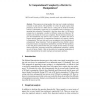Free Online Productivity Tools
i2Speak
i2Symbol
i2OCR
iTex2Img
iWeb2Print
iWeb2Shot
i2Type
iPdf2Split
iPdf2Merge
i2Bopomofo
i2Arabic
i2Style
i2Image
i2PDF
iLatex2Rtf
Sci2ools
137
Voted
CLIMA
2010
2010
Is Computational Complexity a Barrier to Manipulation?
When agents are acting together, they may need a simple mechanism to decide on joint actions. One possibility is to have the agents express their preferences in the form of a ballot and use a voting rule to decide the winning action(s). Unfortunately, agents may try to manipulate such an election by misreporting their preferences. Fortunately, it has been shown that it is NP-hard to compute how to manipulate a number of different voting rules. However, NPhardness only bounds the worst-case complexity. Recent theoretical results suggest that manipulation may often be easy in practice. To address this issue, I suggest studying empirically if computational complexity is in practice a barrier to manipulation. The basic tool used in my investigations is the identification of computational "phase transitions". Such an approach has been fruitful in identifying hard instances of propositional satisfiability and other NP-hard problems. I show that phase transition behaviour gives insi...
CLIMA 2007 | CLIMA 2010 | Computational Complexity | Intelligent Agents | Phase Transition | Voting Rules |
Related Content
| Added | 06 Dec 2010 |
| Updated | 06 Dec 2010 |
| Type | Conference |
| Year | 2010 |
| Where | CLIMA |
| Authors | Toby Walsh |
Comments (0)

